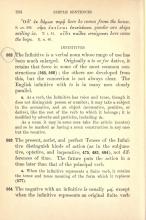557. The endings of the verb indicate the person (first, second, or third) with sufficient clearness; hence the personal pronouns in the nominative, ἐγώ, σύ, ἡμεῖς, ὑμεῖς, are used only when emphasized. So in the third person οὗτος, ὅδε, or ἐκεῖνος as subject.
Ἐγὼ ὀκνοίην ἂν ἐμβαίνειν
I should myself hesitate to go aboard.
Xen. Anabasis 1.3.17
ἀλλʼ εἶδεν τοῦτο καλῶς ἐκεῖνος
But HE saw this clearly.
Demosthenes 4.5
558. For the three meanings of αὐτός see § 199. Note that when standing alone in the nominative αὐτός always means ipse, emphasising some word understood.
Αὐτὸς ξυνειδώς φησιν;
Does he say it of his own knowledge?
Soph. Oedipus the King 704
ἥξει γὰρ αὐτά.
Things will come of themselves.
Soph. Oedipus the King 341
αὐτὸς ἔφη. [ipse dixit]
He himself (the master) said it.
In other cases also the word emphasized by αὐτός may be omitted.
Πλευστέον εἰς ταύτᾱς αὐτοῖς ἐμβᾶσιν.
You must sail, going on board in person (ῡ̔μῖν being understood).
Demosthenes 4.16
a. Note also the idiomatic use of αὐτός with an ordinal numeral.
Ἡιρέθη πρεσβευτὴς δέκατος αὐτός.
He was chosen ambassador with nine others (himself tenth).
Xen. Hellenica 2.2.17
559. In phrases like ἡμέτερα αὐτῶν (οur own things) the possessive pronoun (adjective) and the possessive genitive are put side by side, as equivalent constructions, instead of ἡμῶν αὐτῶν, etc.
560. Ὅς retains its earlier force, as a demonstrative, in a few phrases.
Ἦ δʼ ὅς
said he
καὶ ὅς ἔφη
and he said
So καὶ ἥ, καὶ οἵ. Cp. § 549.
a. For the use of ὅς as a relative see §§ 613, 614.
561. a. Oὔτος in the nominative is sometimes used in calling to a person.
Oὗτος, τί ποιεῖς;
You there, what are you doing?
Aristoph. Frogs 198
b. Note also ὅδε. οὗτος, or ἐκεῖνος in the predicate, translated by here, there, etc..
Ὅ δʼ ἐκ δόμων περᾷ.
Here he comes from the house.
Soph. Antigone 386
νῆες ἐκεῖναι ἐπιπλέουσιν.
Yonder are ships sailing in.
Thucydides 1.51
οἵδε παῖδες στείχουσι.
Here come the boys.
Eur. Medea 46–47



